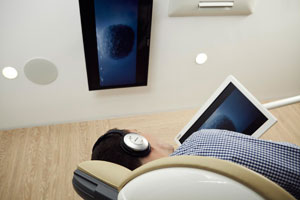Neuromuscular Dentistry
 Neuromuscular dentistry can help to reduce the often debilitating effects associated with irregular jaw position, temporomandibular joint disorder (TMJ) and other conditions. These procedures are designed to improve the bite, restore the position of the jaw and get the muscles, nerves and tissues in proper working order. A misaligned jaw and TMJ disorder can result in a number of symptoms that can have an effect on your day-to-day life, including:
Neuromuscular dentistry can help to reduce the often debilitating effects associated with irregular jaw position, temporomandibular joint disorder (TMJ) and other conditions. These procedures are designed to improve the bite, restore the position of the jaw and get the muscles, nerves and tissues in proper working order. A misaligned jaw and TMJ disorder can result in a number of symptoms that can have an effect on your day-to-day life, including:
- Headaches
- Ringing ears
- Jaw popping/clicking
- Numbness in the arms/hands/fingers
- Neck and shoulder pain
- Worn and chipped teeth
Our dentists employ very sophisticated diagnostic techniques to evaluate the position of your jaw and create a treatment plan that restores good balance and harmony between the temporomandibular joint, the muscles and the teeth. Custom-designed orthotic appliances, orthodontic treatments, and restorative dentistry procedures are all options that can be used to minimise these conditions and help your mouth maintain a relaxed position.
Frequently Asked Questions About Neuromuscular Dentistry
We understand you may have several questions about neuromuscular dentistry and the available treatment options. Our top Sydney dentists have provided answers to some of the most commonly asked questions about this concern. For additional information, please talk to our knowledgeable team.
What is neuromuscular dentistry?
This specialized field of dentistry is designed to identify and correct misalignment in the jaw by enhancing the function of all oral tissues, including the nerves, muscles, joints, and teeth. Our skilled dentists use a selection of advanced diagnostic technologies to measure the jaw and determine the ideal alignment. Once a customized treatment plan is created, we can begin to improve function through one or more restorative procedures.
What types of diagnostic tools can be used?
Some of the most commonly used tools include X-rays and digital radiographs, as well as electromyography (EMG), which is used to measure the jaw in both stressed and relaxed states. Additionally, joint vibration analysis and sonography can be used to listen to the jaw and record any unusual sounds to determine if there are structural abnormalities. Your care and comfort are our top priorities, and we will utilise an array of techniques to help identify the underlying cause of your misalignment.
How can malalignment be addressed?
Every treatment plan will be tailored to the unique needs of the individual, and it will often include restorative procedures that can enhance how teeth fit together (occlusion), thereby supporting jaw function. Some examples include orthodontic treatments and dental implants. To help better position the jaw, orthotic devices may be recommended. TENS (Transcutaneous Electrical Neural Stimulation) is also commonly used to relax jaw muscles that may contribute to the concern. Our dentists will review your plan with you in detail so you can be prepared for what to expect.
For more information on neuromuscular dentistry or if you’d like to make an appointment, please contact us today.

